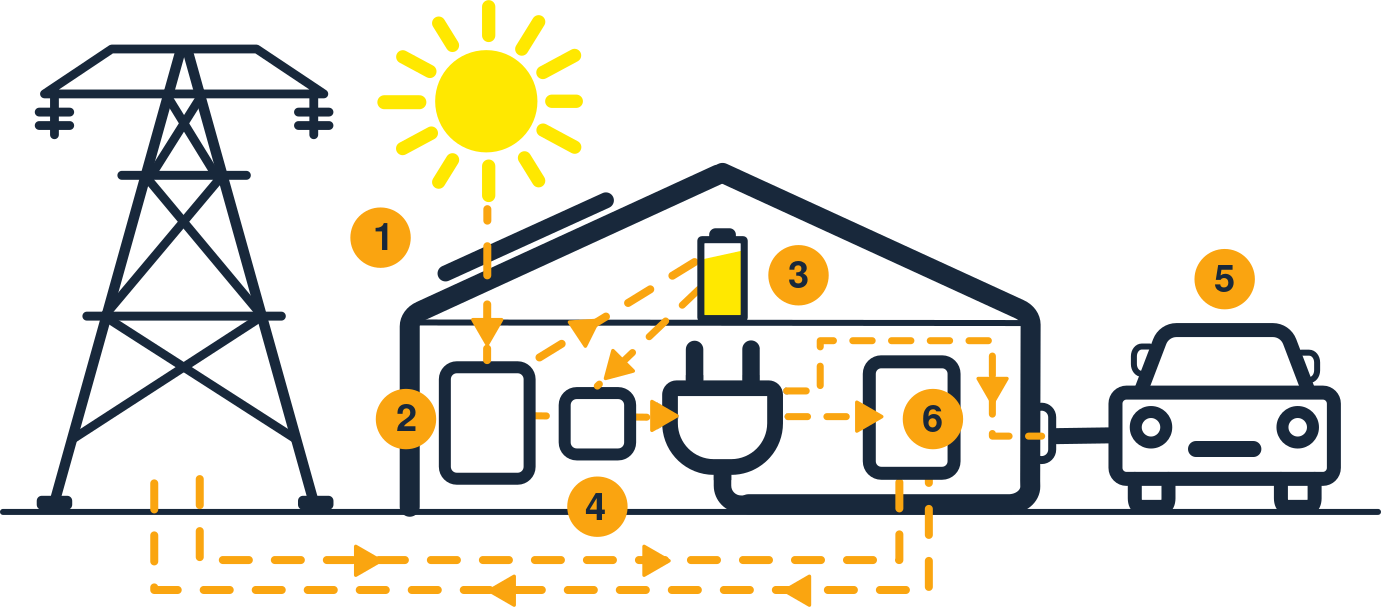



As the world seeks to embrace clean and sustainable energy solutions, solar battery storage has emerged as a game-changer in the renewable energy landscape.
Combining the power of solar photovoltaic (PV) technology with advanced energy storage capabilities, solar battery storage systems offer a reliable and efficient means of capturing, storing, and utilizing solar energy, regardless of the time of day or weather conditions.
Solar battery storage companies in the UK address one of the primary challenges of solar energy: intermittency. Solar PV systems generate electricity only when the sun is shining, and excess energy is often wasted if not used in real-time. By integrating energy storage, solar battery systems can capture surplus solar energy during sunny periods and store it for later use, such as during the evening or on cloudy days. This ability to store solar energy helps bridge the gap between energy generation and consumption, enhancing the overall efficiency and reliability of solar power.
The benefits of solar battery storage are numerous. Firstly, it promotes energy self-sufficiency and reduces reliance on traditional power grids. Solar-powered homes and businesses equipped with battery storage can draw from stored solar energy during peak demand times, reducing the need to purchase electricity from the grid and potentially lowering electricity bills. Additionally, during power outages or grid disruptions, solar battery storage can provide a backup power supply, ensuring continued access to electricity and enhancing energy resilience.
From an environmental perspective, solar battery storage companies contribute to a cleaner and greener future. By storing excess solar energy and using it when needed, the reliance on fossil fuels for electricity generation decreases. This, in turn, helps to reduce greenhouse gas emissions and combat climate change while also reducing air pollution and its associated health impacts.
Furthermore, solar battery storage has significant implications for the integration of renewable energy into existing power systems. The ability to store solar energy allows for a more balanced and stable grid, enabling higher penetration of renewables while reducing the need for expensive infrastructure upgrades to accommodate fluctuating energy generation.
Despite the numerous advantages, challenges remain for widespread adoption. Though decreasing, the cost of solar battery storage systems still presents a barrier to entry for some consumers. Continued research and development are essential to improving battery technology, increasing energy storage capacity, and reducing costs.
In conclusion, solar battery storage companies in the UK play a crucial role in the transition to a sustainable energy future. By unlocking the full potential of solar energy and addressing its intermittency, solar battery storage systems offer a reliable and efficient solution for capturing and utilizing clean energy. As technology advances and economies of scale are realized, solar home battery storage will undoubtedly play a pivotal role in reshaping the global energy landscape, paving the way for a cleaner, more resilient, and renewable-powered world.

To Provide You The Best Solar Experience










Solar panel installation refers to the process of placing solar panels on a residential or commercial property to harness sunlight and convert it into electricity. It involves mounting the panels on rooftops, carports, or ground-mounted structures.
Solar panels contain photovoltaic (PV) cells that convert sunlight into direct current (DC) electricity. The panels are made up of multiple PV cells, which generate an electric current when exposed to sunlight. An inverter then converts the DC electricity into alternating current (AC), which is used to power electrical devices in your home or business.
Most homes are suitable for solar panel installation, provided they have access to sunlight. Ideally, for better battery storage for solar, your roof or property should have a south-facing orientation with minimal shading. However, solar panels can still be installed on east- or west-facing roofs, although they may produce slightly less electricity.
The cost of solar panels in the UK can vary depending on factors such as the size of the system, the type of panels used, and the complexity of the installation. Generally, the cost includes the price of the panels, inverters, mounting equipment, installation labor, and any necessary permits. It’s best to obtain quotes from multiple solar installers to get an accurate estimate for your specific situation.
Solar panels are designed to be durable and long-lasting. Most panels come with a warranty that guarantees their performance for 20 to 25 years. However, solar panels can continue to produce electricity well beyond their warranty period, with many lasting 30 years or more.
Solar panels can still generate electricity on cloudy or rainy days, although their output will be reduced compared to sunny days. While direct sunlight is ideal, solar panels can still produce a significant amount of power in diffused or indirect sunlight. Additionally, excess electricity generated during sunny days can be stored in battery storage for solar or fed back into the grid for later use.
While it’s technically possible to install solar panels yourself, it is generally recommended to hire a professional solar installer. Solar panel installation involves electrical work, knowledge of building codes and permits, and proper system design to maximize efficiency. A professional installer will ensure the panels are safely and correctly installed, comply with regulations, and may also assist with paperwork and permits.
Yes, solar panels can significantly reduce your electricity bills. By generating your own electricity, you rely less on the grid for power, resulting in lower monthly bills. The exact savings will depend on factors such as your energy consumption, the size of the solar system, and local electricity rates. In some cases, you may even generate excess electricity, which can be credited or sold back to your utility company.
Yes, there are various financial incentives available for solar panel installations in many countries. These incentives can include tax credits, rebates, grants, and net metering programs. It’s advisable to research and consult with a local solar installer or energy authority to understand the incentives and subsidies available in your area.
Yes, it is often possible to add more solar panels to an existing system in the future. This depends on the design and capacity of your current system and the available space for additional panels. It’s best to consult with a solar professional to assess the feasibility and compatibility.

©2023 This website is the property of Solar4Good UK Ltd. The content of this website and the information contained therein informs the user of the services provided by Solar4Good UK.